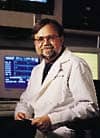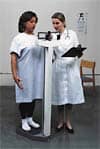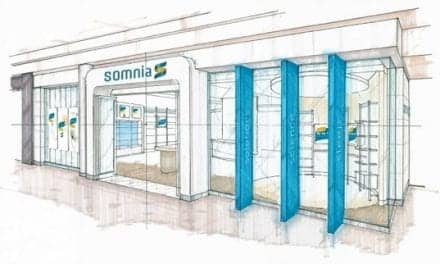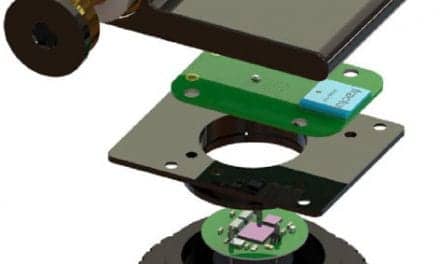Recent research has provided some answers to whether there is a relationship between hypertension and sleep apnea.
Some of the earliest descriptions of patients with sleep apnea noted the frequent association with hypertension. In 1976, Guilleminault et al1 reported that many sleep apnea patients also had high blood pressure. Lugaresi et al2 also reported improvement in hypertension following tracheotomy for sleep apnea. Sleep apnea and hypertension are more common in overweight males. Is the hypertension related to the sleep apnea? Is the hypertension related to obesity? Is the hypertension related to sleep disruption? The relationship between hypertension and sleep apnea has been debated for many years, and recent research has provided some answers to these questions.
Case Study
A 52-year-old woman was referred to the Sleep Center of Pardee Hospital in Hendersonville, NC, for possible sleep apnea. She had experienced labile hypertension for several years and had been treated with gradually increasing doses of several different antihypertensive medications. Her blood pressure was poorly controlled on three different medications. She had never complained about sleep problems, but had admitted to her family doctor that she was tired during the day. Her family doctor then referred her to the sleep center to see if sleep apnea could be part of the reason that her hypertension had been so difficult to control.
 The patient told the physician that she had gradually gained weight over the years, particularly after back pain limited her physical activity. She had a body mass index (BMI) of 28 and said her husband had told her that she snored, but he had never witnessed any nocturnal apnea spells where she woke up gasping for air. She slept for 7 hours a night but awoke feeling tired in the morning. She was mildly sleepy during the day and estimated that her Epworth Sleepiness Scale was at 12. She believed that she was more tired and fatigued than she used to be and did not have the energy that she had in the past.
The patient told the physician that she had gradually gained weight over the years, particularly after back pain limited her physical activity. She had a body mass index (BMI) of 28 and said her husband had told her that she snored, but he had never witnessed any nocturnal apnea spells where she woke up gasping for air. She slept for 7 hours a night but awoke feeling tired in the morning. She was mildly sleepy during the day and estimated that her Epworth Sleepiness Scale was at 12. She believed that she was more tired and fatigued than she used to be and did not have the energy that she had in the past.
The patient said she was diagnosed with hypertension 5 years previously. Initially, she was successfully treated with medicine, but in the past 2 years, her blood pressure had been much more difficult to treat. She had headaches when her pressure was elevated and her family doctor had tried several medications, but her pressure remained high. She was then referred to a hypertension specialist who excluded traditional secondary causes of hypertension. She did not know if her fatigue was related to a sleep problem or some of the new hypertension medications she was currently taking.
The patient was tested in the sleep center and was found to have moderate sleep apnea with an apnea-hypopnea index (AHI) of 24 and moderate oxygen desaturation during REM sleep with oxygen saturation dropping as low as 77%. She elected to try nasal CPAP treatment.
Several months after starting CPAP therapy, the patient was seen for follow-up visits. She was feeling much better with less fatigue and sleepiness, and reported that her blood pressure had improved and her physician had decreased her blood pressure medication. She is currently on only one antihypertensive and her blood pressure is much better controlled.
Physiology
During normal non-REM sleep, arterial blood pressure drops to 5% to 14%.3 Normally, the arterial blood pressure drops 5% during stage 1 sleep and then drops a little more with each progression into deeper sleep. Sometimes arterial pressure can drop as much as 20% during stage 4 sleep. Some researchers believe that this drop in blood pressure is due to a drop in cardiac output, while others believe the drop in blood pressure is due to a drop in peripheral vascular resistance and alterations of the autonomic nervous system.4 During REM sleep, there is a significant variation and fluctuation in blood pressure.
Nocturnal Hemodynamics
Sleep apnea occurs when the upper airway collapses repetitively during sleep. This happens when the upper airway is abnormally small in size or is more collapsible than normal. This collapse of the airway and resultant apnea result in increasing inspiratory efforts to reopen this occlusion. Usually SaO2 decreases and Pco2 increases. Often the struggle to breathe results in an arousal and activation of the upper airway muscles that dilate the pharyngeal airway. This opens the airway so breathing can resume. Most patients with apnea experience blood pressure increases in sleep instead of the normal blood pressure decrease. Blood pressure can increase as much as 25% during the sleep of patients with severe apnea. The increase in blood pressure reaches its peak just after the termination of the apnea.5 The rise in blood pressure was once thought to be directly related to the severity of oxygen desaturation.6 Further research has shown that the arousals from sleep cause much of the increase in blood pressure and that hypoxia alone does not cause such a rise in blood pressure.7 There seems to be several mechanisms for the rise in arterial blood pressure with obstructive apneas. The best explanation for the increase in blood pressure during sleep apnea seems to involve an increase in the autonomic tone and subsequent release of catecholamine caused by the arousals associated with obstructive apnea.8 Treatment with nasal CPAP quickly normalizes blood pressure during sleep with most patients.
Systemic Hypertension
For years, there has been a debate as to the relationship of systemic hypertension and sleep apnea. In the 1970s, Guilleminault noted that sleep apnea patients were more likely to have systemic hypertension. In the 1980s, several investigators showed that sleep apnea was present in as much as 40% of people with hypertension9; however, it has been unclear whether the hypertension was causally related to the sleep apnea or related to one of the other many variables such as obesity and alcohol use. Then in 1997, Young et al10 published a study showing an increased risk of systemic hypertension independent of obesity and other factors such as age. Recently, the Wisconsin Sleep Cohort Study, another population-based study of apparently healthy state workers, has made a significant contribution to this debate. These subjects who were found to have sleep apnea had significantly higher blood pressures than did subjects with snoring but without apnea, or subjects with neither snoring nor apnea. The increase in blood pressure found in the sleep apnea patients was present during both wakefulness and sleep. The effect of sleep apnea on blood pressure during the day was clear even when the investigators controlled for weight and gender. The Wisconsin Study revealed that if sleep apnea is found in an individual, there is a very high likelihood of developing hypertension within 4 years. The more severe the apnea, the higher the risk of developing hypertension. This study showed that the probability of sleep apnea patients developing hypertension was independent of other confounding variables such as obesity but very dependent on the severity of sleep apnea.11 This data has been confirmed with other population-based studies such as the Multicenter Sleep Heart Health Study.12 The relative risk of developing hypertension ranges from 1.5 for mild sleep apnea to 5 for severe sleep apnea.
Managing Blood Pressure
Several studies have shown that treatment of sleep apnea results in a significant decrease in systemic blood pressure.2,13-14 Another study showed that treatment with CPAP, at subtherapeutic levels, resulted in no significant blood pressure improvement even though the CPAP decreased apneas and hypopneas by 50%. Increasing the CPAP to therapeutic levels significantly decreased the systemic hypertension.14 These studies show that treatment of sleep apnea improves systemic hypertension, but the CPAP titration needs to be appropriate to make a difference.
 The best explanation for the increase in blood pressure during sleep apnea seems to involve an increase in the autonomic tone and subsequent release of catecholamine caused by the arousals associated with obstructive apnea.
The best explanation for the increase in blood pressure during sleep apnea seems to involve an increase in the autonomic tone and subsequent release of catecholamine caused by the arousals associated with obstructive apnea.
Systemic hypertension has been reported in more than 50% of patients with OSA. The converse is that as many as 40% of hypertensive patients may have undiagnosed OSA. No one is recommending a sleep study as part of the routine hypertension evaluation yet; however, it is clear that, since 40% of hypertension patients have sleep apnea contributing to their blood pressure problems, more hypertensive patients should be screened with sleep studies. Another recent study15 showed that if a hypertensive patient is on antidepressant medication, they have a much higher risk of sleep apnea. Since sleep apnea is associated with hypertension and depression, an individual can be at a high enough risk to warrant sleep testing.
The American College of Chest Physicians recently encouraged a review of the literature regarding sleep apnea and hypertension. While this review found problems with many of the previous noncontrolled studies, the reviewers recommended that sleep apnea be carefully considered in everyone with hypertension, particularly if the person has symptoms such as headaches or fatigue, or has a body habitus associated with apnea.16 A reasonable approach to sleep study testing would be to recommend a sleep study for anyone with hypertension and any symptoms, such as daytime sleepiness, fatigue, depression, or obesity.
John S. Morris, MD, is medical director of the Pardee Hospital Sleep Center, Hendersonville, NC, president of eSleepMD (http://eSleepMD.com/), and board certified in internal and pulmonary medicine.
References
1. Guilleminault C, Tilkian A, Dement WC. The sleep apnea syndromes. Ann Rev Med. 1976;27:465-484.
2. Lugaresi E, Coccagna G, Mantovani M, et al. Effects of tracheostomy in two cases of hypersomnia with periodic breathing. J Neurol Neurosurg Psychiatry. 1973;36:15-26.
3. Khatri IM, Freis ED. Hemodynamic changes during sleep. J Appl Physiol. 1967;22:867-873.
4. Coote JH. Respiratory and circulatory control during sleep. J Exp Biol. 1982;100:223-244.
5. Schroeder JS, Motta J, Guilleminault C. Hemodynamic studies in sleep apnea. In: Guilleminault C, Dement WC, eds. Sleep Apnea Syndrome. New York: Alan R. Liss; 1978:177-196.
6. Shepard JW. Gas exchange and hemodynamics during sleep. Medical Clin North Am. 1985;69:1243-1265.
7. Ringler J, Basner RC, Shannon R, et al. Hypoxia alone does not explain blood pressure elevations after obstructive apneas. J Appl Physiol. 1990;69:2143-2148.
8. Podszus T, Mayer J, Penzel T, et al. Nocturnal hemodynamics in patients with sleep apnea. Eur J Respir Dis Suppl. 1986;146:435.
9. Lavie P, Ben-Yosef R, Rubin AE. Prevalence of sleep apnea syndrome among patients with essential hypertension. Am Heart J. 1984;108:373-376.
10. Young T, Poppard P, Palta M, et al. Population-based study of sleep-disordered breathing as a risk factor for hypertension. Arch Intern Med. 1997;157:1746.
11. Peppard PE, Young T, Palta M, Skatrud J. Prospective study of the association between sleep-disordered breathing and hypertension. N Engl J Med. 2000;342:1378.
12. Nieto FJ, Young TB, Lind BK, et al. Association of sleep-disordered breathing, sleep apnea, and hypertension in a large community-based study. Sleep Heart Health Study. JAMA. 2000;283:1829.
13. Becker HF, Jerrentrup A, Ploch T, et al. Effect of nasal continuous positive airway pressure treatment on blood pressure in patients with obstructive sleep apnea. Circulation. 2003;107:68.
14. Pepperell JC, Ramdassingh-Dow S, Crosthwaite N, et al. Ambulatory blood pressure after therapeutic and subtherapeutic nasal continuous positive airway pressure for obstructive sleep apnoea: a randomised parallel trial. Lancet. 2002;359:204.
15. Farney RJ, Lugo A, Jensen RL, Walker JM, Cloward TV. Simultaneous use of antidepressant and antihypertensive medications increases likelihood of diagnosis of obstructive sleep apnea syndrome. Chest. 2004;125:1279-1285.
16. Dart RA, Gregoire JR, Gutterman DD, Woolf SH. The association of hypertension and secondary cardiovascular disease with sleep-disordered breathing. Chest. 2003;123:244-260.





